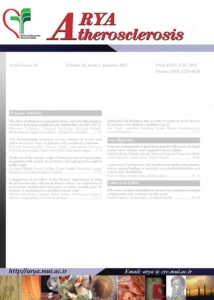Predictive role of adiponectin and high-sensitivity C-reactive protein for prediction of cardiovascular event in an Iranian cohort Study: The Isfahan Cohort Study
Authors
Affiliations
Abstract
Background: Numerous studies have been conducted on the predictive effects of high-sensitivity C-reactive protein (hs-CRP) on cardiovascular events. Few studies have been conducted to investigate the effects of adiponectin for the prediction of the incident of cardiovascular events in the Middle East area. This study compared the predictive effect of hs-CRP and adiponectin on healthy volunteers for the prediction of cerebrovascular disease (CVD).
Methods: This nested case-control in original Isfahan Cohort Study (ICS) was conducted from 2001 to 2011. Participants were selected from ICS. The case group included participants with CVD while the control group included participants without CVD. The level of hs-CRP and adiponectin was measured in the blood samples collected in the year 2007. Thereafter, the statistical analyses were performed to determine the predictive value of hs-CRP and adiponectin in CVD prediction.
Results: The results showed that before the elimination of diabetes effect; there was a significant difference between the two groups, in terms of the mean of adiponectin (P = 0.019) and no significant difference was observed in hs-CRP levels (P = 0.673). However, after eliminating the factor of diabetes, there was no significant difference between the case and control groups in adiponectin and hs-CRP levels (P = 0.184, P = 0.946). The results showed that the odds ratio (OR) of the adiponectin level was 0.879 [95% confidence interval (CI): 0.719-1.075, P = 0.210] while the OR of hs-CRP was 1.045 (95% CI: 0.922-1.185, P = 0.491). Furthermore, it was shown that after adjustment for age, sex, and diabetes; the OR of adiponectine was 0.875 (95% CI: 0.701-1.091, P = 0.235) and that of hs-CRP was 1.068 (95% CI: 0.935-1.219, P = 0.333).
Conclusion: The results show that adiponectin and hs-CRP cannot be predictors for cardiovascular events in a healthy population. Risk factors such as diabetes limit the use of adiponectin as a CVD predictor.
Keywords: Adiponectin; Cardiovascular Disease; High-Sensitivity C-Reactive Protein

